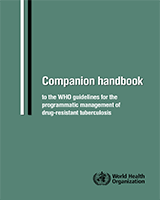Resistance to tuberculosis (TB) drugs is a formidable obstacle to effective TB care and prevention globally. Multidrug-resistant TB (MDR-TB) is multifactorial and fuelled by improper treatment of patients, poor management of supply and quality of drugs, and airborne transmission of bacteria in public places. Case management becomes difficult and the challenge is compounded by catastrophic economic and social costs that patients incur while seeking help and on treatment.
In 2006, MDR-TB strains with additional resistance to second-line drugs were described as extensively drug-resistant TB (XDR-TB) strains, further compromising treatment options available to patients infected with these strains. Since then, clinicians in some settings have reported patients infected with strains in which virtually all treatment options have been exhausted. This rapidly evolving landscape is a clarion call to policy-makers and practitioners to respond with improvements in care delivery and introduction of innovative tools and approaches. In 2009, the 62nd World Health Assembly urged WHO Member States to provide universal access to care for drug-resistant TB patients. In that resolution, it was acknowledged that national TB programme managers, clinicians, nurses, all care providers and affected people themselves need guidance on how best to bring together different elements of health systems and services needed to effectively address the MDR-TB challenge. Therefore, this Handbook has been developed for the purpose of describing ways to implement established WHO policies relevant for the management of MDR-TB. These WHO policy recommendations have been produced using the GRADE methodology for evidence assessment, as adopted by WHO in 2008.
This book is a companion handbook to existing WHO policy guidance on the management of multidrug-resistant tuberculosis, including the WHO guidelines for the programmatic management of drug-resistant tuberculosis and the WHO interim policy guidance on the use of bedaquiline in the treatment of in compliance with the process for evidence gathering, assessment and formulation of recommendations, as outlined in the WHO Handbook for Guideline Development (version March 2010; available at http://apps.who.int/iris/bitstream/10665/75146/1/9789241548441_eng.pdf).
The designations employed and the presentation of the material in this publication do not imply the expression of any opinion whatsoever on the part of the World Health Organization concerning the legal status of any country, territory, city or area or of its authorities, or concerning the delimitation of its frontiers or boundaries. Dotted and dashed lines on maps represent approximate border lines for which there may not yet be full agreement.
The mention of specific companies or of certain manufacturers' products does not imply that they are endorsed or recommended by the World Health Organization in preference to others of a similar nature that are not mentioned. Errors and omissions excepted, the names of proprietary products are distinguished by initial capital letters.
All reasonable precautions have been taken by the World Health Organization to verify the information contained in this publication. However, the published material is being distributed without warranty of any kind, either expressed or implied. The responsibility for the interpretation and use of the material lies with the reader. In no event shall the World Health Organization be liable for damages arising from its use.

